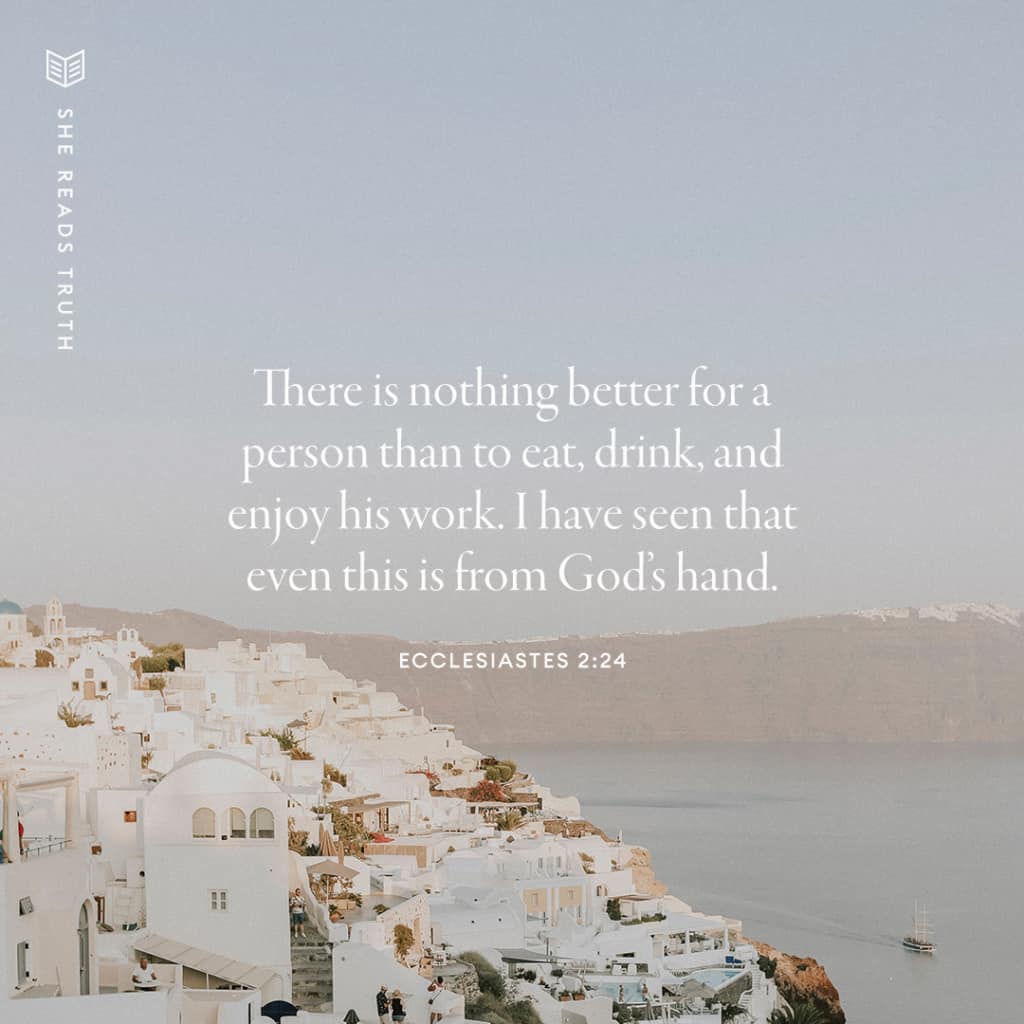The Emptiness of Work
Open Your Bible
Ecclesiastes 2:1-26, Genesis 1:26-28, John 15:9-11
BY Ellen L. Taylor
I turned sixteen the summer before my junior year of high school. Along with the new excitement of being able to drive came the responsibility of having my first “real” job. I worked as a cashier at a neighborhood pharmacy and gift shop in a suburb of Birmingham, Alabama, taking phone calls for prescription refills and stocking the shelves with face lotion and hand soap. But the best part of this summer job was something we lovingly referred to as “Christmas in July”—receiving all of the seasonal products for Christmas at the pharmacy, pricing them accordingly, and keeping track of inventory until they put out the Christmas items in late fall.
I was constantly confused by the juxtaposition of the stifling Alabama summer heat with the Santa Claus figurines and snowflake ornaments. Even so, I loved that job. The fragile ornaments and figurines needed special care while unpacking, and even though it meant I left covered in glitter every day, I paid special attention to them, lifting them gingerly out of their boxes and placing them on the storage shelves where they would sit until they made their debut in the pharmacy. It might not have been the most important job, but I found purpose in it.
King Solomon had one of the most important jobs in the Old Testament. God called him to build the temple where God’s presence would dwell among the Israelites (1Chronicles 22:6–10). This was an incredible honor, one that God didn’t even entrust to King David, who was considered a “man after [God’s] own heart” (1Samuel 13:14).
Despite all this, Ecclesiastes 2 tells us that King Solomon struggled with the purpose of work. He writes, “I hated all my work that I labored at under the sun because I must leave it to the one who comes after me. And who knows whether he will be wise or a fool? Yet he will take over all my work that I labored at skillfully under the sun. This too is futile” (Ecclesiastes 2:18–19). To the author of Ecclesiastes, leaving his work behind after death made it meaningless, a pursuit of the wind. But he goes on to explain that while he felt as though his work was meaningless, there is “nothing better for a person than to eat, drink, and enjoy his work” (v.24).
In Genesis 1, after the creation of humankind, God instructed Adam and Eve to work, telling them, “Be fruitful, multiply, fill the earth, and subdue it. Rule the fish of the sea, the birds of the sky, and every creature that crawls on the earth” (Genesis 1:28). God’s design for humanity always included work—it preceded the fall! Our work is not meaningless; we are called to it. And when we do our work for the glory of the one who worked first to create us, it has eternal meaning and significance.

99 thoughts on "The Emptiness of Work"
-
I am currently at home taking care of my 2 months old baby and my 3 years old daughter. Soma days feel like what Salomon talks about. I look at the day behind me and ask myself: What did I do all day? Fed the baby, fed the older one, changed diapers, made snacks, fed the baby again. It feels like I didn’t do anything important. But God called me to this, it is important work even if it feels small sometimes.
-
Most days I feel just the same most recently and it is a struggle in my mind, reminding myself that God does not do anything by accident, so all that is transpiring and me being home during this pandemic is a blessing. I just need to stay close to my hope in God and remember that just as the Father loved Christ, so He loves me.
-
I feel like this too sometimes. My husband finishes work and comes downstairs to chaos. Unwashed dishes and toys everywhere and I wonder what value I’ve brought to the household that day. But my little boy is fed and clean and happy and that’s what I’ve achieved
-
-
Blessed Beth, you sound like me but I am a nurse. I am going to nurse until I feel the Lord tells me it is time to stop.
Lisa I fully agree with you.
Sarah D., you are wise beyond your years. Your comment really struck me and made me think. i hope you don’t mind if I copy it on to an index card and keep where I can read it frequently.
-
I can’t speak for everyone, but I know I myself have often felt like the author of Ecclesiastes. I have struggled with pride and worried others may not do the job as well as I do. I have tried to find joy in material possessions, or consumed alcohol to “loosen up” and be more fun. What a blow to find out I am replaceable at work after all, the excitement of a new purchase is short lived, and experimenting with alcohol only leads to poor decisions. As many of you have mentioned, the common theme in those situations is that I’m focused on myself. I’m navel gazing instead of looking up. When my perspective is shifted to do all things for His glory (1 Corinthians 10:31) and not mine, that is where lasting fulfillment lies.
-
Angie, praising Jesus and praying continued strength for you and your husband. He is so very good our Lord. Thank you all for your insights, and sharing. I glean so much from all of you and am thankful I get to read your thoughts and the wisdom God shares in this place gives me joy. Solomon is right it is futile all of it, but God, it is all meaningless and we work in vain. But He gives us His work and can do so in any position or place He gives us to work in. I have been blessed to work in many different places and positions and in all of it what I have learned is that when I listen and watch for the Lord, He gives me good things to do, to speak, and to give Him praise and that makes the daily difference as I seek to encourage and love those he puts in my path. I am so blessed to work with the people I get to now, in a place that looks out for clergy and missionaries financially worldwide. I am so blessed by both the vision of the leadership and the integrity and servanthood of everyone there. Because of who our clients are, I feel that I get to serve so many who serve the Lord and how truly awesome is that. So thankful. May God give you all His joy in whatever He gives you to do.
-
❤️
-
-
Ecc 2:20-21 really made me think of what Jesus did for us, he worked so hard of earth to teach and show the people the way to freedom was through God. He gave everything to save us, we didn’t earn it or deserve it but we still receive salvation and grace from God. Much like Solomon’s fear of leaving his empire to someone who doesn’t deserve it.
-
I love my job! I work with kids and mainly kindergartners. They are so adorable! So when this pandemic happened and schools were closed, it was so hard for me. God gave me this job! When I first went to back to work full-time it was hard. But through the years (just celebrated 10 years)
 I have grown to love these little children, pray for them silently and love on them as most of them are with us longer than they are at home.  -
Is working vanity or good? What is the motive of our labor? What power do we use to complete our work? In Genesis 1:26-28, we see that God created humans and gave us the purpose of working and subduing the earth. Then Solomon expresses this angst of which I’m familiar. His experimentation with trying to find satisfaction in his work (as well as in pleasure) brings him to draw the despairing conclusion that it is “all vanity.” Why? His focus seems to initially be on “what does it do for me” kind of thinking. But then, not only does Solomon seem to have his mind reoriented to remember God’s gifts and purposes in our lives, but in John 15:9-11, Jesus teaches us that for those who abide in him, we will be equipped to do the good works of love. And love is truly the motive we are to have for everything we do. First, love for God, then for our neighbor. It is by the power of the Spirit of Christ who dwells in us that we can complete the work the Lord has and this for his glory. Without abiding in Christ all of our work is empty, but in Christ our work is blessed. What a gift! What a promise!



Post Comments (99)